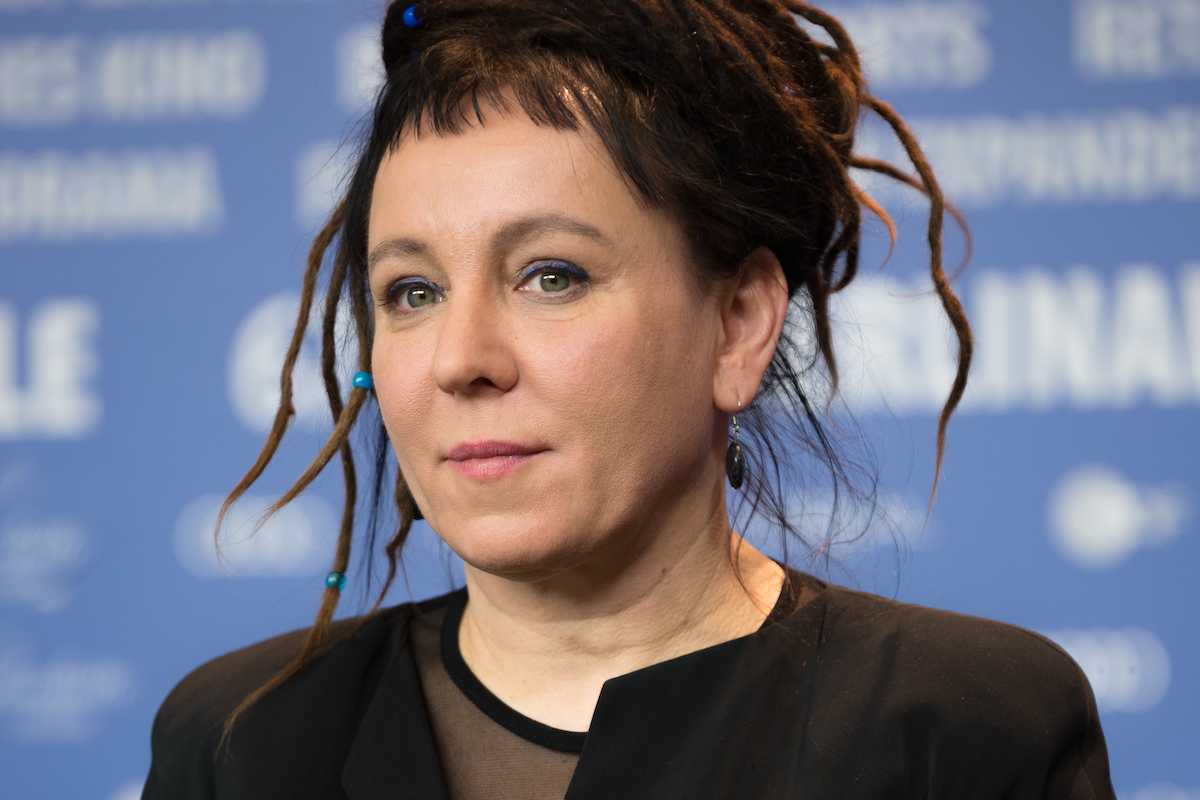Free Speech
Olga Tokarczuk: Poland's "Patriots" Struggle To Accept The Nobel Prize
Tokarczuk is a passionate proponent of tolerance, feminism and European unity.

For a few minutes on Thursday afternoon, after Olga Tokarczuk’s Nobel Prize in Literature had been announced by the Nobel Committee, Polish public television did not mention her name. Her picture appeared on the screen of TVP Info, the public news channel, along with the headline: “A Pole Awarded the Nobel Prize.” But her name was conspicuously omitted.
I had rushed to turn on our TV at the Warsaw editorial offices of Gazeta Wyborcza, a liberal newspaper, to see how public television would handle the news. Previous Polish Nobel Laureates—from Marie Curie to Wisława Szymborska—have been sources of great national pride in Poland. But Tokarczuk is on the Polish Ministry of Culture’s informal “black list,” and it may well be that in the minutes following the announcement of her award, the TVP Info editors simply did not dare mention her name. So, ironically, a writer who has been consistently denounced as unpatriotic by the ruling national-conservative establishment, was simply described as a Pole.
This weekend, a week before the parliamentary elections next Sunday (October 13), the charismatic chairman of the ruling Law and Justice Party (PiS), Jarosław Kaczyński, lashed out against the country’s “cultural elites.” Kaczyński is the most powerful politician in Poland, and a more dominant political figure than both the Prime Minister and the President. During a rally in the Polish city of Sosnowiec, he declared that the country’s new cultural elites do not work for “the enemies of Poland.”
Who are these enemies of Poland? In Kaczyński’s worldview, they are Polish artists, like Olga Tokarczuk, who have not adhered to the ideology promulgated by PiS since its election victory in 2015—an ideology central to its project to reshape Poland along authoritarian lines. According to the party, writers and filmmakers must not reopen the country’s national wounds, or remind the public of the darkest chapters of the country’s history—such as those shameful instances in which Poles gave their Jewish countrymen up to the Nazis during the Second World War.
Instead, according to the PiS view, history must be treated as a source of inspiration for young Poles, and it is therefore the duty of artists to present a glorious past and focus on the heroic deeds of the Polish people. Artists who follow the Party’s demands are rewarded, but not all have agreed to do so. Among those who have resisted, some had already attained fame in the West and were therefore not dependent on the government for funds.
When Kaczyński denounced the Poles who continue to work with the “enemy,” he no doubt included Olga Tokarczuk—a symbol of the kind of culture which the Polish right most fiercely despises. Tokarczuk is a passionate proponent of tolerance, feminism and European unity. She has defended the rights of Polish women and sexual minorities, for instance by protesting a proposed ban on abortion in 2016. In her books, she deals merciless blows to the image of Polish heroism, which PiS is doing its best to promote. Tokarczuk has repeated that Poles “in the past did terrible things”: as colonizers; as a majority suppressing minorities; as owners of slaves; and in some cases, as murderers of Jews.

“I believe that we need to face our own history and rewrite it without hiding all those horrible things,” she said when she received the Nike Prize in 2016, the most prestigious writer’s award in Poland.
Piotr Gliński, the PiS Minister of Culture and National Heritage, is of a different view. He has forcefully imposed PiS ideology on Polish cultural life in the four years since his appointment. He intervened against the showing of a theatre piece which he found obscene; he cut funding for a music festival because he found the people involved in it too controversial; he fired the director of the famous Museum of the Second World War, claiming that he had not done enough to stress how Poland suffered during the German occupation; he has refused to sign the nomination of the elected director of the Museum of History of Polish Jewry, because the director claimed that anti-Semitism remains a problem in today’s Poland; and he recently called for Polish cultural elites to be replaced by more “Polish” and “patriotic” individuals.
Tokarczuk’s inclusion on the informal “black list” of Gliński’s ministry, means that she should not be invited or promoted by cultural institutions run by the Polish government abroad. The Polish Book Institute—another institution under Gliński’s control—which promotes the translation and publication of Polish writers outside Poland, has removed translations of Tokarczuk’s novels from its priority list and replaced her with authors who are loyal to the party and whose patriotism is not in question.
On Tuesday, two days before the Nobel Committee’s announcement, Gliński appeared as a guest on a Polish TV show. As the conversation turned to Tokarczuk’s work, Gliński did his best to play down her importance as a writer: “I started reading her books, but never finished them,” he said.
It is little wonder that, when her Nobel Prize was announced two days later, Poland’s public television was at loss to know how to deal with the news. In December 2015, PiS passed a new law which allows the government to take full control over the public media. In the following weeks, editors-in-chief were replaced by politicians from PiS. More than 200 journalists were fired or otherwise forced to quit. They were denounced as unpatriotic, un-Polish and disloyal to the ruling party.
Since then, public media has been broadcasting pure propaganda: They praise the government, and are ready to admonish and slander everybody who opposes it—be they politicians of the opposition, malicious journalists, decadent artists, Angela Merkel, Hillary Clinton or Emmanuel Macron. The Polish government has a long and growing list of enemies.
Shortly after Tokarczuk’s Nobel Prize was announced, somebody managed to call Culture Minister Gliński and broadcast the phone conversation live. The Minister was noticeably embarrassed. He dryly congratulated Tokarczuk, allowed that it was an important day for Polish culture and went on to promise on Twitter that he would finish reading her books.
Shortly afterwards, public television decided to run with the pack. Tokarczuk’s Nobel Prize, it decided, was a glorious victory for Polish patriotism after all. In the hours that have passed since Thursday afternoon, public television has incessantly broadcast the message that Tokarczuk’s award is a success for Poland and its formidable government. It is just another lie promulgated at the whim of the ruling party.






